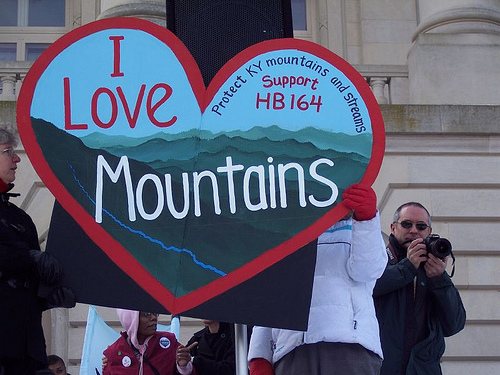 Activists in the Kentucky governor’s office.Photo: Chad Berry
Activists in the Kentucky governor’s office.Photo: Chad Berry
This post originally appeared at Facing South.
This Valentine’s Day marks the fourth day of a historic sit-in at the Kentucky governor’s office calling for an end to mountaintop removal. Meanwhile, thousands of Kentuckians are gathering outside in the state capital of Frankfort for the “I Love Mountains” march calling for an end to the environmentally destructive coal mining practice.
Among those who have been taking part in the Kentucky Rising sit-in at the office of Gov. Steve Beshear (D) since Friday are the acclaimed writer and environmental activist Wendell Berry (second from left in photo); Mickey McCoy (at left), a retired teacher and former mayor from Martin County, Ky., where more than 300 gallons of toxic mining sludge were released into the water supply in 2001; and Stanley Sturgill (at right), a former underground coal miner and federal mine inspector.
“We call upon Gov. Beshear to lead by ending mountaintop removal, by beginning a sincere public dialogue about creating sustainable jobs for our hard-working miners, by putting the vital interests of ordinary Kentuckians above the special interests of an abusive industry,” the protesters said in a joint statement.
This is the first sit-in of its kind in Kentucky history. It was sparked by Beshear’s decision to partner with the coal industry and file a lawsuit against the Environmental Protection Agency for cracking down on permits for mountaintop-removal operations. In his recent State of Kentucky address, Beshear called for the EPA to “get off our backs.”
The governor met with the protesters for about 40 minutes, but said he planned to continue his lawsuit against the EPA. However, he did agree to visit Eastern Kentucky to witness the impact of mountaintop removal, and he also invited the protesters to stay in his office as long as they’d like.
To date, over 290 mountains have been destroyed by mountaintop-removal mining operations in Kentucky alone.
The people’s movement against destructive coal mining practices is gaining momentum in that state, where a judge recently granted environmental groups’ request to intervene in a settlement the state offered coal companies that engaged in widespread violations of the Clean Water Act. The groups believe the settlement doesn’t sufficiently address the companies’ violations.
This is the first time that a third-party intervention has been allowed between a potential Clean Water Act violator and a Kentucky state agency.


